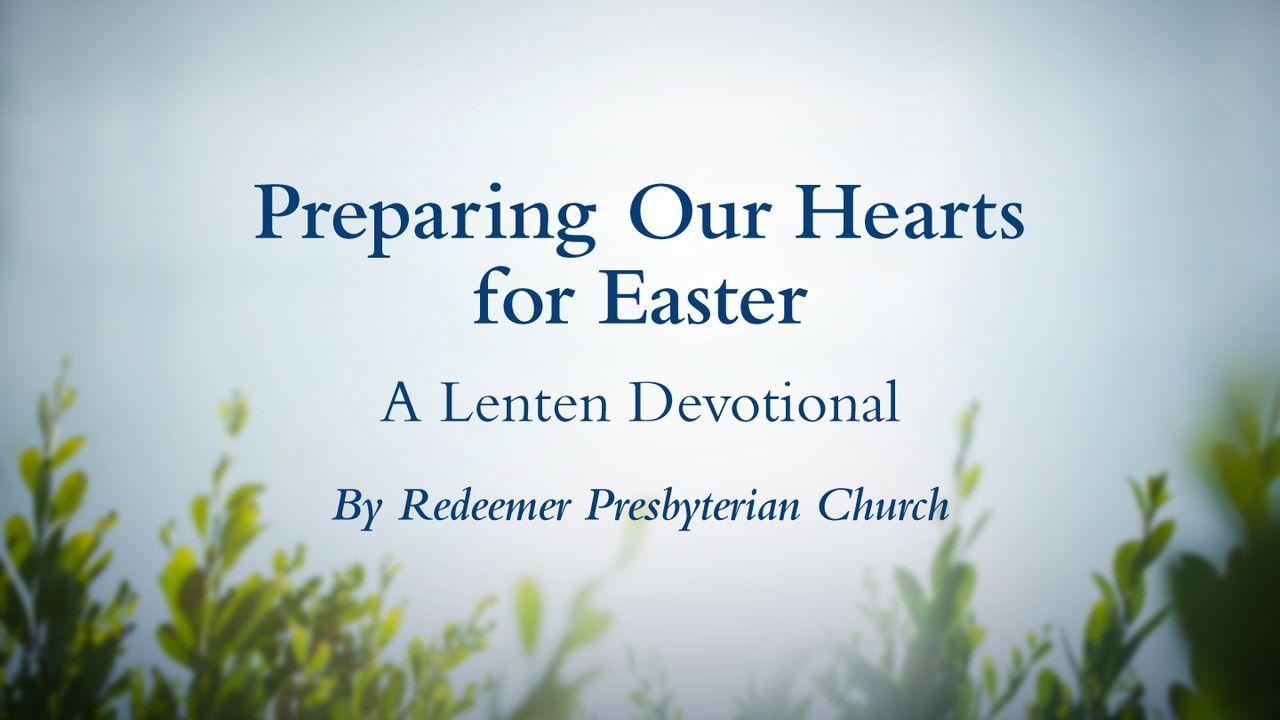Preparing Our Hearts for Easter: A Lenten DevotionalSample

"Day 12: The Stone"
In the parable of the tenants, the owner of a vineyard leases his property to others and travels abroad. While away, he sends his servants to collect his share of the fruit from the land, but the tenants beat his servants and then kill them. Finally, he sends his son to collect the fruit, reasoning, “They will respect my son” (Mark 12:6). But he is wrong. They kill his son too.
Jesus explained what the parable meant by quoting Psalm 118: “Have you not read this Scripture: ‘This stone that the builders rejected has become the cornerstone; this was the Lord’s doing, and it is marvelous in our eyes’?” (Mark 12:10-11, cf. Matthew 21:42). In other words, God is the owner of the vineyard. The tenants are his people. They were supposed to give him the fruit of their lives through worship and obedience. But they rejected his prophets and messengers. Finally, he sent his Son. But they rejected him too. In rebellion, they would not respect or honor him as the Son of God. Instead, they killed him.
Yet Jesus was not swept away by a storm of angry and uncontrolled men. His rejection was according to the intentional plan of God — “the Lord’s doing.” This is “marvelous in our eyes” because the death of Christ defeated death itself. We rejoice because God picked up Jesus from the grave and made him the cornerstone of salvation for everyone who believes. In him, therefore, we will live and never die (John. 11:25-27).
Prayer
Lord, you work everything according to your good will. Although Christ’s death seemed like defeat, you vindicated him by raising him from the dead. In him, therefore, we sing, “We shall not die, but we shall live” (Psalm 118:17). He is our salvation. It is marvelous in our eyes. In Christ’s Name, Amen.
Copyright (c) 2012 by Redeemer Presbyterian Church.
In the parable of the tenants, the owner of a vineyard leases his property to others and travels abroad. While away, he sends his servants to collect his share of the fruit from the land, but the tenants beat his servants and then kill them. Finally, he sends his son to collect the fruit, reasoning, “They will respect my son” (Mark 12:6). But he is wrong. They kill his son too.
Jesus explained what the parable meant by quoting Psalm 118: “Have you not read this Scripture: ‘This stone that the builders rejected has become the cornerstone; this was the Lord’s doing, and it is marvelous in our eyes’?” (Mark 12:10-11, cf. Matthew 21:42). In other words, God is the owner of the vineyard. The tenants are his people. They were supposed to give him the fruit of their lives through worship and obedience. But they rejected his prophets and messengers. Finally, he sent his Son. But they rejected him too. In rebellion, they would not respect or honor him as the Son of God. Instead, they killed him.
Yet Jesus was not swept away by a storm of angry and uncontrolled men. His rejection was according to the intentional plan of God — “the Lord’s doing.” This is “marvelous in our eyes” because the death of Christ defeated death itself. We rejoice because God picked up Jesus from the grave and made him the cornerstone of salvation for everyone who believes. In him, therefore, we will live and never die (John. 11:25-27).
Prayer
Lord, you work everything according to your good will. Although Christ’s death seemed like defeat, you vindicated him by raising him from the dead. In him, therefore, we sing, “We shall not die, but we shall live” (Psalm 118:17). He is our salvation. It is marvelous in our eyes. In Christ’s Name, Amen.
Copyright (c) 2012 by Redeemer Presbyterian Church.
About this Plan

What is Lent? It is a time in which we anticipate the victory of the light and life of Christ over the darkness of sin and death. As we journey from Ash Wednesday to Easter, we are reminded of the reality of our frailty and God’s redeeming grace.
More
This devotional was created by the staff of Redeemer Presbyterian Church and was originally posted on www.redeemer.com in 2012. Used by permission.
Related Plans

Forgive Them Too??

Creating to Heal: 7 Days of Healing Through Art & Prayer

Ways to Overcome Your Fears: Devotions for Girls (I Am Fearless)

Adventure in Evangelism

Jesus Never Said ‘Hustle’: Finding True Rest in a Burnout World

Cornerstone: Rebuild, Renew, Restore

When God Is Silent: Finding Faith in the Waiting

Be Ye Holy: The Holy Spirit's Role in Our Lives

Who Is Jesus?
